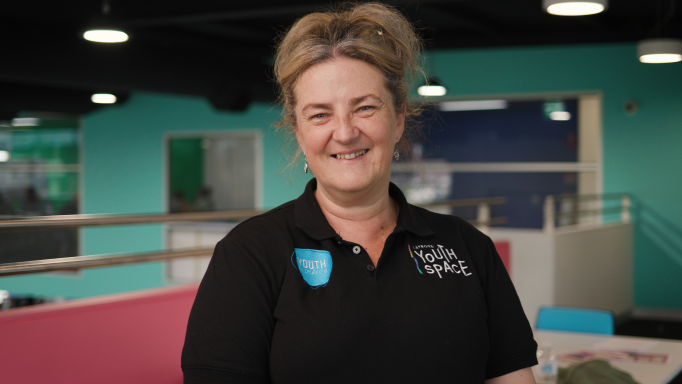If we invested more money into early intervention, we could be helping to prevent some seriously traumatic experiences that young people don't necessarily have to go through.
–Maree May, Latrobe Youth Space
Maree May (she/her) is a youth worker at Latrobe Youth Space in Gippsland on Gunaikurnai Land, in an early intervention therapeutic program.
“I love the program because all of the sessions that we do are [about] subjects that young people have said, ‘this is real stuff that we deal with.’ So we talk about sexual abuse, we talk about drugs and alcohol. We talk about family breakdowns, we talk about grief. And we provide a safe space for young people to tell their story.”
Maree sees young people through a full circle. When they first come along to her sessions, they might not speak to anyone or they might cry at first. But over time the young people will take back their power and even become leaders within the program.
“Being able to celebrate their successes is amazing. I’ve got one young person now who’s just started his first job. He’s just started a savings account and he’s told me how much he’s got saved in his ‘car account’, and he’s doing driving lessons on the side. This is a young person who was homeless at 14 and hadn’t lived with family since before that.”
Maree believes that part of why the Latrobe Youth Space works is because it’s not an explicit ‘welfare’ service. Instead, youth workers are on the ground and available with the skills to pick up on different triggers.
“Sometimes the biggest challenges for young people can be not knowing what supports are out there. Where can they go, who’s the safest person? A lot of young people that we work with have been removed [from their families]. There’s that natural non-trust of authority figures so they wouldn’t naturally go to the police for help, they wouldn’t naturally go to a GP or a hospital.
“[That’s why] I love the Latrobe Youth Space – I love this whole concept – because this is a safe place for young people to come and talk to a safe adult, and get linked into the right supports and care that they need.”
I love watching them have their own lightbulb moment to take back power of their life.
–Maree May, Latrobe Youth Space
Unfortunately, youth workers like Maree also face several challenges due to scarce resources and funding – particularly in regional areas. She shares that local workers will often ‘put their heads together’ to find creative solutions, but that can only go so far.
“The hardest thing about being a youth worker would be the lack of resources or spaces for real care when you need to link a young person into that. For example, if I had a young person come to me right now who was homeless, there is no way right now I could actually send them to find a bed.
“The reality is sometimes you might wake up at three o’clock in the morning, because you truly care about a young person that you’re working with, and you have not been able to link them to the right worker yet [or] there’s a waiting list.
“More funding for youth work would be a great safety net for young people. The importance of local, place-based youth services is that young people can link into real care, and they can have a safe place to go and talk to people who can give them support and advice with whatever issue it is that they’re dealing with.”
Maree shared her story as part of YACVic's Youth Work Matters campaign. Find out more about the campaign here.
You can also read more stories of how youth work supports young people here.




